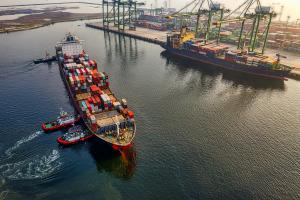
New study reveals EU regulations will boost economic value of methanol in shipping
Research concludes that regulations will progressively incentivize the adoption of renewable fuels enhancing the business case for bio- and e-methanol.
BRUSSELS, BELGIUM, September 25, 2024 /EINPresswire.com/ -- A new white paper prepared for the Methanol Institute by Dr Jeroen Dierickx, an energy and fuel expert at iDefossilise, concludes that the FuelEU Maritime Regulation and EU Emissions Trading System (ETS) will create a level playing field for bio- and e-methanol, making them economically competitive compared to fossil marine fuels.Under the EU’s Fit for 55 regulatory package, vessel operators are incentivized to transition to these sustainable fuels through significant penalties levied on continued fossil fuel use. For fuel producers, the regulations offer a stable, long-term framework from 2024 to 2050, paving the way for secure investment opportunities in the maritime sector.
Gregory Dolan, CEO of the Methanol Institute, stated: ‘’The study confirms the profound impact of regulations on the demand for methanol as a marine fuel. The findings indicate that the emerging EU regulatory framework is robust enough to enhance the business case for low-carbon and renewable methanol fuels and fuel blends, supporting the transition to a sustainable maritime industry.’’
Key findings of the study:
- Regulatory penalties and costs: The FuelEU Maritime Regulation sets targets for reducing greenhouse gas emissions from the maritime sector and imposes increasingly severe penalties on fossil fuels such as Very Low Sulfur Fuel Oil (VLSFO). Non-compliance costs for vessel owners will escalate from €39 per ton in 2025 to €1,997 per ton by 2050.
- EU ETS implementation: Regulatory costs under the EU ETS, carbon emission trading scheme that also covers the maritime sector, are phased in from 40% in 2024 to 100% in 2026. With a projected market price of €100 for CO2 emission allowances, the additional cost for VLSFO is estimated at €321 per ton.
Compliance options: To avoid these penalties, vessel owners can use bio- or e-methanol, or blends of fossil and sustainable methanol as viable compliance options and encourage the development of a sustainable methanol supply chain.
- Price estimates: The analysis forecasts the average maximum price for bio-methanol to be €1,193 per ton from 2025-2050. For e-methanol, prices are estimated at €2,238 per ton from 2025-2033, decreasing to €1,325 per ton from 2034-2050 when the reward factor for using renewable fuels of non-biological origin (RFNBO) expires in 2034. Including EU ETS costs, these prices rise by €150 per ton for both fuels.
- Fuel blends: Every five years, the FuelEU Maritime greenhouse gas emission targets increase, from 2% in 2025 to 80% by 2050. These targets can be met by blending bio- or e-methanol with conventional natural-gas based methanol, increasing from 14% bio-methanol and 7% e-methanol in 2025 to 28% bio-methanol and 25% e-methanol in 2035, and fully 100% bio-methanol and 91% e-methanol by 2050.
- Economic viability: Both bio- and e-methanol show significant economic potential under the new regulations. The FuelEU Maritime Regulation and EU ETS are expected to effectively promote the adoption of these sustainable fuels in maritime shipping.
This study marks an important milestone for the maritime sector, providing a clear pathway for companies to align with regulatory frameworks while transitioning to sustainable fuel options. It further provides an investment timeline for producers to align production of conventional and renewable methanol with projected demand.
Download the full study
About Methanol Institute (MI):
MI is the global trade association representing the world’s leading methanol producers and distributors, transporters, shipowners, and technology companies. With over 100 members and offices in Washington D.C, Brussels, Delhi, Singapore, and Beijing, we serve as the voice of the global methanol industry, promoting methanol as a key chemical building block and an alternative fuel for transportation and power generation. For more information, visit www.methanol.org and connect with us on LinkedIn, X and Facebook.
Aria Koutra
Methanol Institute
+1 703-248-3636
akoutra@methanol.org
Distribution channels: Business & Economy, Chemical Industry, Energy Industry, Shipping, Storage & Logistics
Legal Disclaimer:
EIN Presswire provides this news content "as is" without warranty of any kind. We do not accept any responsibility or liability for the accuracy, content, images, videos, licenses, completeness, legality, or reliability of the information contained in this article. If you have any complaints or copyright issues related to this article, kindly contact the author above.
Submit your press release

